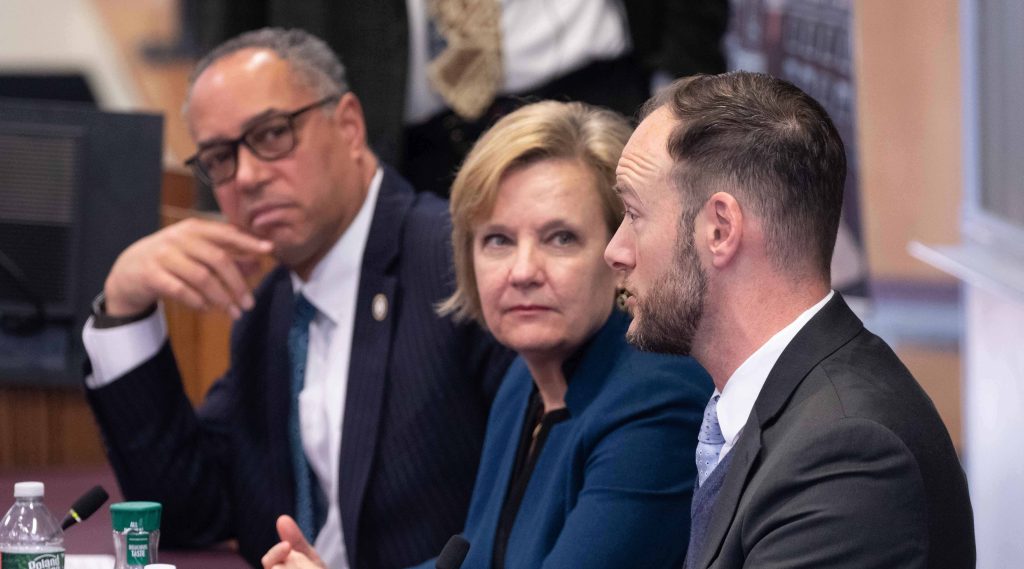A Rappaport Center for Law and Public Policy panel on the future of progressive prosecution, comprising current and former district attorneys and prosecutors, gathered on February 1 to discuss the fortitude of the progressive movement.
The panelists included Suffolk County [Massachusetts] District Attorney Kevin Hayden, who initially took office when then-District Attorney Rachael Rollins was appointed US Attorney for the District of Massachusetts, and was recently elected to the position; Donna Patalano ’01, an expert on wrongful convictions who served as former general counsel when Rollins was Suffolk DA; and Chesa Boudin, who served as San Francisco District Attorney from 2019 to 2022, when he was recalled by the electorate as a result of his progressive policies. Boudin spent three days at BC Law as the Rappaport Senior Fellow in Residence.
Boston College Law Professor R. Michael Cassidy, an expert on criminal law, evidence, and prosecutorial ethics, moderated the discussion.
Hayden started the conversation by outlining the priority areas for a so-called “progressive prosecutor.”
“As a Black man, how our criminal legal system has affected us has been vitally important to me,” Hayden said. “There is not a shadow of a doubt about racial inequities and injustices in our criminal justice system. If we don’t have the integrity to handle that truth, then we’re really missing the boat.”
Patalano emphasized that there is no one-size-fits-all for progressive prosecutors, but that they should lead with a vision, intentionality, and inclusivity. Data-driven review is critical to determine what angle succeeds. Accountability and transparency build trust with the community. “To wrap it up in a sentence,” Patalano said, “a progressive prosecutor is a person who is a force of nature, who is brave, who has a backbone of steel forged through her own life experiences.”
Citing his own experience and the recall election that cost him his job in 2022, Boudin agreed that progressive prosecutors must project a vision for the future, challenging though that vision may be to traditional systemic norms.
Hayden, when pressed by Cassidy as to whether he has walked back any of his predecessor Rollins’s progressive positions, disagreed. He said his transition team looks at data and statistics to inform the public of the office’s positions. “My belief is that you have got to look at each and every situation and make independent decisions,” Hayden said. “I think that is what prosecutors are meant to do.”
Patalano countered: “The ability to have written policies in order to keep the staff accountable is essential. I’m not sure that is something as robust in DA Hayden’s administration as it was.” She also pointed out the strength and impact of the conviction integrity review board in Rollins’s administration. The Suffolk DA’s office under Rollins played a role in remedying 410 years of wrongful incarceration, Patalano said, but she also expressed concern that the conviction integrity unit’s future remains uncertain. Hayden maintained that conviction integrity is of high importance to his office, and that his team is still completing its research.
Cassidy asked if there was a trade-off between transparency and deterrence in the effort to reduce crime and prosecutions. Boudin replied that if there was a correlation between the two, crime would have gone up while he was in office but that, in fact, the crime rate went down during his two-and-a-half years as DA.
“Deterrence is real, but it doesn’t just have to do with the severity of the punishment or rate of prosecution,” Boudin said. “It has to do with certainty of arrest. If people know they are going to get arrested, they are less likely to commit the crime regardless of who is district attorney. We need to think holistically and upstream.”


